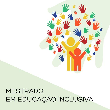Banca de DEFESA: FABRICIA LIDIANE CAMILO PEDROSO
Uma banca de DEFESA de MESTRADO foi cadastrada pelo programa.DISCENTE : FABRICIA LIDIANE CAMILO PEDROSO
DATA : 18/07/2024
HORA: 18:00
LOCAL: Sala google meet.google.com/rqv-wuya-vha
TÍTULO:
LITERACY OF STUDENTS WITH INTELLECTUAL DISABILITIES THROUGH PHONOLOGICAL AWARENESS ACTIVITIES IN SPECIALIZED EDUCATIONAL SERVICE: Challenges and paths
PALAVRAS-CHAVES:
key words: Inclusion. Pedagogical practices. Literacy. Phonological awareness. Mild intellectual disability.PÁGINAS: 168
GRANDE ÁREA: Ciências Humanas
ÁREA: Educação
RESUMO:
UMMARY
Our society is surrounded by written language in the most different forms. Reading and writing skills are constantly required, so being literate and mastering the written language are fundamental issues for schools, which should aim to provide everyone with the possibility of reading and writing, including students with mild intellectual disabilities. . In this work, we present the theoretical foundation and preliminary data, as well as the methodology used for this purpose. This research, therefore, set out to analyze pedagogical interventions that involve phonological awareness activities for the development of the alphabetic writing system for students with mild intellectual disabilities, enrolled in the final years of elementary school. The specific objectives are: to reflect on the life history of these students, starting from the social context from birth to school life; identify real knowledge about the alphabetic system, specifically with regard to writing and reading skills; describe the effects of phonological awareness activities on the development of the alphabetic writing system in these individuals; identify whether the mediation of phonological awareness activities contributes to progress in writing. Using a qualitative approach, this investigation was carried out in a state school in the city of Sinop/MT. We used participatory research, since the researcher is inserted in the researched environment and carried out the pedagogical interventions.
The research participants are two students with mild intellectual disability (ID), enrolled in the final years of elementary school (7th year), not literate, as well as their guardians. Data collection took place through diagnostic assessments (initial and final), pedagogical interventions using phonological awareness activities and interviews with those responsible. For the theoretical basis, among the authors used, we highlight: Vygotsky (2003, 2007, 2010, 2011, 2022), a pioneer in studies on the learning and development processes of people with disabilities at the beginning of the 20th century, and Magda Soares (2022, 2004), theoretical that investigates the development of writing acquisition in children. The partial considerations of the research indicate that pedagogical interventions aimed at phonological awareness have a positive impact on the development of the alphabetic writing system in these subjects who are the object of study in this research. Preliminary results suggest that phonological awareness activities contributed to improving reading and writing skills, providing them with the development of linguistic skills. Furthermore, the interventions were well received and students with ID demonstrated interest in participating in the proposed activities.
MEMBROS DA BANCA:
Presidente - 78800009 - IVONE JESUS ALEXANDRE
Interna - 68601002 - LUCIENE NEVES SANTOS
Externa ao Programa - 112972002 - EDNEUZA ALVES TRUGILLO



